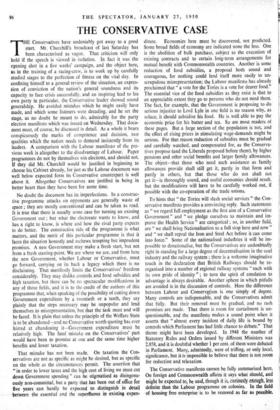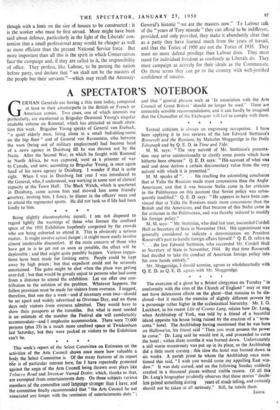THE CONSERVATIVE CASE
THE Conservatives have undeniably got away to a good start. Mr. Churchill's broadcast of last Saturday has been characterised as vague. That criticism will only hold -if the speech is viewed in isolation. In fact it was the opening shot in a five weeks' campaign, and the object here, as in the training of a racing-crew, is to work up by carefully studied stages to the perfection of fitness on the vital day. In confining himself to a general review of the situation, an expres- sion of conviction of the nation's general soundness and its capacity to face crisis successfully, and an inspiring lead to his own party in particular, the Conservative leader showed sound generalship. He avoided mistakes which he might easily have made, and which some listeners were dreading. and be set the stage, as no doubt he meant to do, admirably for the party election manifesto which was issued on Wednesday. That docu- ment must, of course, be discussed in detail. As a whole it bears conspicuously the marks of competence and decision, two qualities which the nation needs to demand insistently from its leaders. A comparison with the Labour manifesto of the pre- vious week is altogether to the disadvantage of Labour. Paper programmes do not by themselves win elections, and should not. If they did Mr. Churchill would be justified in beginning to choose his Cabinet already, for just as the Labour document was well below expected form its Conservative counterpart is well above it. Altogether Conservatives are justified in being in better heart than they have been for some time.
No doubt the document has its imperfections. In a construc- tive programme attacks on opponents are generally waste of ;pace ; they are mostly conventional and can be taken as read. It is true that there is usually some case for turning an existing Government out ; but what the electorate wants to know, and has a right to know, is where and how the rival party expects to do better. The constructive side of the programme is what matters, and the merit of this particular programme is that it faces the situation honestly and eschews tempting but imprudent promises. A new Government may make a fresh start, but not from a fresh starting-point. We are where we are, and from here the new Government, whether Labour or Conservative, must go forward, carrying on its back a legacy which there is no disclaiming. That manifestly limits the Conservatives' freedom considerably. They may dislike controls and food subsidies and high taxation, but there can be no spectacular modifications in any of those fields, and it is to the credit of the authors of this programme that, when speaking of the possibility of cutting down Government expenditure by a twentieth or a tenth, they say plainly that the steps necessary may be unpopular and lend themselves to misrepresentation, but that the task must and will be faced. It is plain that unless the principle of the Welfare State is to be abandoned—and no Conservative worth quoting has ever hinted at abandoning it—Government expenditure must be relatively high. The fatal mistake on the Conservatives' part would have been to promise at one and the same time higher benefits and lower taxation.
That mistake has not been made. On taxation the Con- servatives are not as specific as might be desired, but as specific on the whole as the circumstances permit. The assertion that in order to lower taxes and the high cost of living we must cut down Government spending" can be stigmatised as disingenu- ously non-committal, but a party that has been out of office for five years can hardly be expected to distinguish in detail -between the essential and the superfluous in existing expen- diture. Economies here must be discovered, not predicted. Some broad fields of economy are indicated none the less. One is the abolition of bulk purchase, subject to the execution of existing contracts and to certain long-term arrangements for mutual benefit with Commonwealth countries. Another is some reduction of food subsidies, a proposal both sound and courageous, for nothing could lend itself more easily to un- scrupulous misrepresentation; the Labour manifesto has already proclaimed that "a vote for the Tories is a vote for dearer food." The essential vice of the food subsidies as they exist is that to an appreciable extent they go to persons who do not need them. The fact, for example, that the Government is proposing to-do serious injustice to Lord Lyle in one field is no reason why, as solace, it should subsidise his food. He is well able to pay the economic price for his butter and tea. So are most readers of these pages. But a large section of the population is not, and the effect of rising prices in stimulating wage-demands might be serious. For that reason reduction of subsidies must be gradual and carefully watched, and compensated for, as the Conserva- tives propose (and the Liberals proposed before them), by higher pensions and other social benefits and larger family allowances. The object—that those who need such assistance as family allowances provide shall still get it, partly in that form and partly in others, but that those who do not shall not get it—is thoroughly sound, and useful economies should result. but the modifications will have to be carefully worked out, if possible with the co-operation of the trade unions.
To hints that "the Tories will slash social services" the Con- servative manifesto provides a convincing reply. Such statements as " we regard full employment as the first aim of a Conservative Government" and "we pledge ourselves to maintain and im- prove the Health Service" are categorical ; so, in another field, are "we shall bring Nationalisation to a full stop here and now" and "we shall repeal the Iron and Steel Act before it can come into force." Some of the nationalised industries it will be im- possible to denationalise, but the Conservatives are undoubtedly right in standing for a large degree of decentralisation in the coal industry and the railway system ; there is a welcome imaginative touch in the declaration that British Railways should be re- organised into a number of regional railway systems "each with its own pride of identity " ; to turn the spirit of emulation to advantage is always desirable. Another sphere in which pitfalls are avoided is in the discussion of controls. Here the difference between Labour and Conservatism is one simply of degree. Many controls are indispensable, and the Conservatives admit that fully. But their removal must be gradual, and no rash promises are made. That there is room for curtailment is un- questionable, and the manifesto makes a sound point when it asserts that "almost every incident of daily life is bound by controls which Parliament has had little chance to debate." That theme might have been developed. In 1948 the number of Statutory Rules and Orders issued by different Ministers was 2,858, and it is doubtful whether i per cent. of them were debated in Parliament. Many, admittedly, were of trifling, or only local, significance, but it is impossible to believe that there is not room for reduction and relaxation.
The Conservative manifesto cannot be fully summarised here. On foreign and Commonwealth affairs it says what should, and might be expected to, be said, though it is, curiously enough, less definite than the Labour programme on colonies. In the field of housing free enterprise is to be restored as far as possible. though with a limit on the size of houses to be constructed ; it is the worker who must be first served. More might have been said about defence, particularly in the light of the Liberals' con- tention that a small professional army would be cheaper as well as more efficient than the present National Service force. But more important than all this is the spirit in which Conservatives facethe campaign and, if they are called to it, the responsibility of office. They profess, like Labour, to be putting the nation before party, and declare that "we shall not be the masters of the people but their servants "—which may recall the Attorney- General's historic "we are the masters now." To Labour talk of the "years of Tory misrule" they can afford to be indifferent, provided, and only provided, they make it abundantly clear that as a party they have learned much from the years of travail, and that the Tories of 1950 are not the Tories of 1935. They must no more defend privilege than Labour does. They must stand for individual freedom as resolutely as Liberals do. They must campaign as actively for their ideals as the Communists. On those terms they can go to the country with well-justified confidence of success.











































 Previous page
Previous page